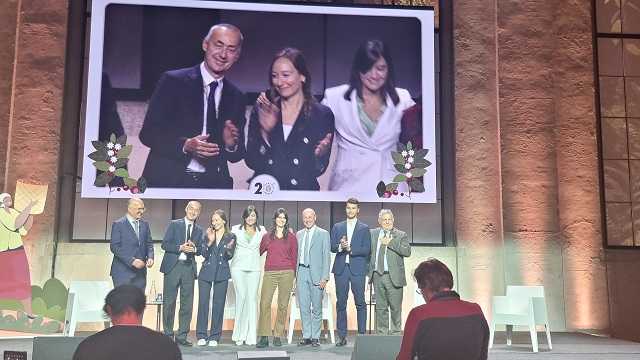TURIN, Italy – After the invitation of the Lavazza Foundation, AICS (Italian Agency for Development Cooperation) took part in “The Coffeeprint of Tomorrow” event, held at the Centrale Nuvola Lavazza in Turin on September 30th to celebrate the 20th anniversary of the Giuseppe and Pericle Lavazza Foundation. Moderated by Sky journalist Mariangela Pira, the event saw participation from many of Lavazza Foundation’s partners, as noted by President Giuseppe Lavazza in his opening speech.
Among the key participants were numerous NGOs, including Save the Children (a 22-year partner), Oxfam, Engim, CESVI, Mani Tese, COSPE, and Soleterre, along with several national, international, and local entities, governments, and government agencies (including Ecuador, Cuba, Colombia, GIZ from Germany, and Austria’s ADA). Today, the Lavazza Foundation is involved in 30 projects across 20 countries on 3 continents, benefiting over 180,000 people, aligned with the SDGs.
The event retraced the Foundation’s history, from its first three projects supporting small coffee producers in Colombia, Honduras, and Peru (under the ¡Tierra! brand), to its social commitments during conflicts and international crises (e.g., in Haiti and during COVID). Looking ahead, the Foundation aims to focus more on protecting children. Its latest project in Ecuador, developed with UNDP, involves the first high-quality coffee production certified as “deforestation-free,” sourced from plantations in 23 provinces bordering the Amazon rainforest, alongside the development of the country’s first national certification protocol for monitoring forest areas in coffee production.
In Guatemala, the “Coffee to be Reborn” project, developed with the Civil Association Verdad y Vida, aims to empower women and bridge the gender gap in the coffee supply chain (women make up 70% of the labor force in coffee harvesting, but only 20-30% own the plantations). Through this project, 180 women from the indigenous Maya Poq’omchi community in Guatemala, a community devastated by 36 years of civil war and ethnic cleansing, have become independent—first as producers and then as entrepreneurs—through agricultural and business training programs.
In Uganda, the Ujana Coffee Project, launched by the Lavazza Foundation in collaboration with the NGO Sawa World, involves young people living in coffee-producing areas or urban settings in vulnerable conditions, helping them develop micro-enterprises related to coffee or local crafts, thereby diversifying and increasing their incomes.
A special guest at the event was Guatemalan activist and 1992 Nobel Peace Prize winner Rigoberta Menchú Tum, a promoter of peace through trust, dialogue, and the sharing of ancestral indigenous knowledge. She stressed that “peace also passes through a grain of coffee” and continues to dream of formal academic paths that could educate future generations towards a true culture of peace. International photographer Steve McCurry, a long-time collaborator of the Foundation since its first advertising campaign, also spoke via video. The event highlighted the recent launch of the podcast “Il Respiro della Terra” (“The Breath of the Earth”), offering an immersive experience into coffee plantations in the tropical forest of Colombia’s Meta Department.
Several key elements contribute to sustainable and balanced development in the coffee supply chain, as noted by Secretary Mario Cerutti, including multi-stakeholder partnerships and training, which are essential for sharing best practices that ensure product quality.
AICS, as part of Italy’s broader strategy for resilience in the coffee supply chain promoted in the G7 agenda, has long supported actions to assist coffee-producing communities, especially in Africa (a priority area under the Mattei Plan) and Latin America. This support includes projects on training, adapting to climate change, improving production and phytosanitary practices, enhancing technology, and expanding markets.
Finally, it’s important to note the involvement of the Lavazza Foundation in Cuba, as part of the AICS initiative “Avenida Italia – Integrated Urban Rehabilitation for Local Development and Support for Innovative, Organic, Sustainable, Community-Based, Creative, and Circular Economies.” This project, implemented by the Provincial Government of Havana, the Municipal Government of Central Havana, and Unioncamere Piemonte with technical support from AICS’ Havana office, aims to enhance the Avenida Italia area through architectural and urban restoration. Lavazza Foundation’s collaboration in this initiative includes the creation of a Factory Museum and the development of activities to promote and sell local products.

















